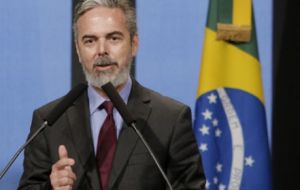MercoPress. South Atlantic News Agency
Brazil/Uruguay overrule Argentina: no Mercosur economic sanctions on Paraguay
 Brazilian Foreign Minister Patriota was the spokesperson for the group
Brazilian Foreign Minister Patriota was the spokesperson for the group Mercosur will not impose economic sanctions on Paraguay despite concerns over the ousting of the country's president, officials said on Thursday evening at the summit taking place in Mendoza, Argentina.
Mercosur will suspend Paraguay from the trading bloc after the ousting of Paraguayan president Fernando Lugo, Brazilian foreign minister Antonio Patriota explained.
“All of the foreign ministers are considering a decision that will be analyzed on Friday by all presidents. We discussed the possible suspension of Paraguay from Mercosur. We deeply regret this situation but we acknowledge that there is no democratic order there right now,” he said during a press conference.
Paraguay's Senate removed Fernando Lugo from office last Friday in an impeachment trial that lasted a matter of hours, prompting criticism in the region and beyond. However the removal complied with the Paraguayan constitutional procedure and was voted 76 to 1 in the Lower House and 39 to 4 in the Senate.
Mercosur responded by banning Paraguay from attending the bloc's summit this week. Patriota said that punishment would stand until democracy was fully restored in Paraguay. The country is scheduled to hold elections next April.
A clause calling for democracy in the Mercosur bloc ”first refers to the suspension of (a country's) participation in meetings, and then there's a second phrase on the suspension of rights and obligations,“ Patriota told reporters.
”The decision was that we would limit ourselves to the first phrase,” Patriota said.
The summit began with a meeting among Mercosur foreign ministers at which Paraguayan envoy Ignacio Mendoza Unzain was denied access.
Although landlocked Paraguay with a 6 million population and the world’s fourth exporter of soy beans has a long history of political instability and military rule, the remaining Mercosur full members were not unanimous as to the steps to follow.
Argentina was the most radical to the extent it wanted ousted president Fernando Lugo to sit at the Mercosur summit and implement other sanctions. Cristina Fernandez the champion of democratic institutions and human rights.
Uruguayan president Jose Mujica from the very beginning said that he was totally contrary to any kind of economic or financial sanctions against the new regime simply because “it’s the people who end up suffering and paying the bill”.
Finally Brazil not only has very close political, trade and energy links with Paraguay, (20% of its electricity comes from the shared Itaipú dam, the world’s largest operational hydroelectric complex) but also an estimated 400.000 Brazilians, known as Braziguayos live in the country and most are prosperous farmers and business people.
A delegation of Braziguayos was among the first to visit President Federico Franco to express their support and promise to lobby with the Brazilian government.
Under former president Lugo, law and order in the rich farmlands had deteriorated as the “carperos” (Paraguay’s version of the landless peasants) were occupying farms and destroying property when evicted and threatening farm owners with an occasional kidnapping.
The former bishop and preacher of the “liberation theology” dragged his feet when having to combat or keep the ‘carperos’ in line until the shootout incident in which 17 people were killed (eleven peasants and six policemen) that triggered the impeachment and Lugo’s removal.
Finally from a diplomatic point of view Brazil came out with burnt fingers when a similar but more serious incident in Honduras, when the president was ousted and flown out of the country by the military following orders from Congress and the Supreme Court.
Brazil in 2009 organized ousted president Manuel Zelaya resistance from its embassy in Tegucigalpa where he had helped the leader sneak back, and refused point blank to recognize the new regime.
End of story, the electoral calendar was honoured, a new president was freely elected, Zelaya allowed to return and Brazilian diplomacy saw the whole incident explode in its face. It was quite an embarrassment for Itamaraty at one time considered one of the most professional and efficient diplomatic services of the world.
At Friday’s ceremony Cristina Fernandez will hand the Mercosur chair for the next six months to Brazil’s Dilma Rousseff.




Top Comments
Disclaimer & comment rules-

-

-

Read all comments“Cristina Fernandez the champion of democratic institutions and human rights.”
Jun 29th, 2012 - 10:36 am 0execpt when it comes to the prosperous peaceful people of The Falklands apparently they have no rights and she does not accept the democratic vote to decide their future being held next year.
Champion my @ss, shes only sh1tting herself incase shes next on the impeachment list.
I always get the impression that CFK wants to be seen/believed to be “the champion of democratic institutions and human rights.”
Jun 29th, 2012 - 11:55 am 0I don't believe she really cares about either - they are simply political tools in her armoury. A bit like Michael Jackson claiming to love animals - and children.
Brazil/Uruguay overrule Argentina
Jun 29th, 2012 - 12:43 pm 0Thanks guys,
That’s really going to piss the witch off,
And guess who she is going to blame,
Yep, you guessed it,
[its all our fault ]
.
Commenting for this story is now closed.
If you have a Facebook account, become a fan and comment on our Facebook Page!